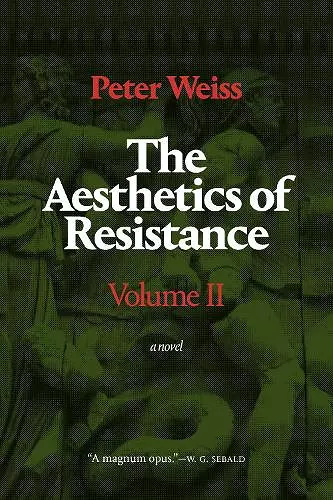The Aesthetics of Resistance, Volume II
A Novel
Peter Weiss author Joel Scott translator
Format:Paperback
Publisher:Duke University Press
Published:18th Feb '20
Should be back in stock very soon

This second volume of Peter Weiss's trilogy explores anti-fascist resistance, art, and political movements during the late 1930s and World War II.
Originally published in German in 1978 and now available in English for the first time, The Aesthetics of Resistance, Volume II continues the exploration of anti-fascist resistance, radical political movements, and the interplay between art and resistance during the late 1930s and World War II. This significant literary work marks the second installment of Peter Weiss's three-volume novel, providing English-speaking audiences with access to one of the monumental pieces of twentieth-century German literature. Weiss, renowned for his play Marat/Sade, delves into the complexities of political struggle through a rich tapestry of historical context and artistic reflection.
The narrative begins with an unnamed narrator in Paris, having withdrawn from the front lines of the Spanish Civil War. His journey takes him to Stockholm, where he engages with the Communist Party and encounters notable figures, including Bertolt Brecht. Through the narrator's contemplations on various artistic mediums, The Aesthetics of Resistance, Volume II is populated with characters, many of whom are inspired by real historical personas. Weiss intricately weaves together themes of art and political resistance, suggesting that true meaning emerges from the act of opposing oppression, regardless of its severity.
Ultimately, this volume serves as a profound examination of the relationship between creativity and activism. Weiss emphasizes the importance of art as a means of envisioning new forms of political action and social awareness, making The Aesthetics of Resistance an essential text for understanding the nuances of twentieth-century German history and culture.
“[The Aesthetics of Resistance,] which [Peter Weiss] began when he was well over fifty, making a pilgrimage over the arid slopes of cultural and contemporary history in the company of pavor nocturnus, the terror of the night, and laden with a monstrous weight of ideological ballast, is a magnum opus which sees itself . . . not only as the expression of an ephemeral wish for redemption, but as an expression of the will to be on the side of the victims at the end of time.” -- W. G. Sebald, * On the Natural History of Destruction *
“The Aesthetics of Resistance is centrally important to any kind of assessment of twentieth-century German history.” -- James Rolleston, editor of * A Companion to the Works of Franz Kafka *
"The Aesthetics of Resistance is a work born out of a profound dissatisfaction with the ways we are given to think about history, politics, and those great works of art that offer to do more than merely reflect them. It is also born out of a deep misgiving about the authorial self, and the blindness to which it must give rise, since the existential individual is not a sufficient basis on which to erect an historically relevant aesthetic truth—indeed, it is a screen for masking it." -- Julian Murphet * Sydney Review of Books *
"For the right reader, The Aesthetics of Resistance offers unique rewards. The West’s literary memory of twentieth- century communism was largely shaped by ex- and anti-Communist writers like Arthur Koestler, Alexander Solzhenitsyn, Czesław Miłosz, and George Orwell, who saw it as inimical to spiritual and intellectual life. Weiss makes a passionate case to the contrary, arguing that for the poor and oppressed, communism offered a key to spiritual and intellectual realms from which they had been historically excluded. But he is also acutely aware that the humanistic, emancipatory communism of his dreams had a foe in the actual Soviet Communist Party, with its demand for total submission to an ever-changing ideological line. Balancing hope against reality, Weiss’s novel tries to carry out the critique-from-within he outlined in his 'Ten Working Points' essay." -- Adam Kirsch * New York Review of Books *
"The second volume of Peter Weiss's The Aesthetics of Resistance, translated from the German by Joel Scott, ran like a red thread through this year's reading. Merging ekphrasis with a vibrant history of revolutionary struggle in early 20th-century Europe, this dense, serious novel helped to anchor me against the panicked churning of the news cycle." -- Anne Boyer * Wall Street Journal *
"Weiss’ capacity to marshal all this material within an immensely readable text would be miraculous even if throughout the novel we did not encounter some of the most serious considerations of works from within the canon of Western art, all rendered within a prose style of great clarity, quality and political commitment held at a pitch and stretching over a duration that is unmatched in any work of fiction of which I am aware. . . . The appearance of the second volume of Weiss’ The Aesthetics of Resistance in English, thanks to the efforts of Duke University Press, confirms its reputation as one of the twentieth century’s most unique and distinctive works of literary art." -- Chris Beausang * Marx & Philosophy Review of Books *
"At once a compeling tale of that resistance and an informative leftist history of the period it is situated in, Weiss’s Aesthetics of Resistance is not just his piéce de résistance, but a piéce de résistance of the twentieth century." -- Ron Jacobs * Counterpunch *
"With The Aesthetics of Resistance, Weiss was attempting something rare in the history of the form: a novel that marries vanguard politics and avant-garde aesthetics." -- Ryan Ruby * The Point *
ISBN: 9781478006992
Dimensions: unknown
Weight: 476g
336 pages
Translated from the German